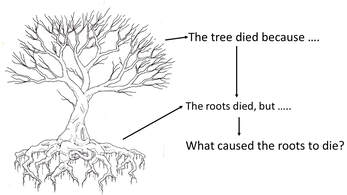 "Root Cause" "Root Cause" There is something in the field of quality management called “root cause analysis”. You may now be asking what this has to do with writing books. I’ll get to that in a minute or two, but first of all I’ll have to explain what root cause analysis is and how it works. Basically, it is an assumption that when something goes wrong in a process, the visible signs are very rarely the root cause of what went wrong. To make sure that the same problem never occurs again, you have to find the root, or real, cause of the problem. It is the difference between treating the symptoms (a headache, say) and treating the cause (a brain tumour). Aspirin may temporarily relieve the pain of the symptom, but it won’t cure the brain tumour. Let me give you a worked example.  Guess the cause! Guess the cause! Car A is driving along the road and approaches a stop sign. Being driven by a good driver, the car is brought to a controlled stop in the right place. Car B, following on behind, then crashes into the back of Car A. The assumption, at this point, might be that the driver of Car B wasn’t paying adequate attention and therefore didn’t see Car A coming to a stop and ran into the back of him. Only by asking questions would it be possible to establish if that assumption was correct. In quality management a tool that is used is called “The 6 Whys”. Basically it means that by asking six “why” questions in succession it is possible to find out what the real cause of the accident was. So, question 1 might be “Why did the driver of Car B fail to stop? There are several possible answers, only one of which will be true. For the sake of this illustration, I’ll say that the actual answer is “Because the car’s brakes failed.” The second why question would therefore be “Why did the brakes fail?” Again, there are several possible answers, only one of which will be true. If you ask a further 4 “why” questions in this vein you might get to an answer that is “Because there is a flaw in the manufacturing process for a minor component that hadn’t been previously identified”. Obviously more evidence than just one accident would be needed before that conclusion could be drawn, but gathering that evidence, such as data on other accidents, would be part of finding the true answer.  Brake failure? Or inattentive driver? Brake failure? Or inattentive driver? So, the root cause of the accident is that flaw in the manufacturing process and unless that flaw is corrected, other accidents involving brake failures are bound to occur. That is a long way from “Driver B wasn’t paying attention to his driving”. It is just that sort of process that leads to product recalls on cars, sometimes several years after production started, to rectify defects that have been subsequently identified. If you work in a place where the same problems keep on occurring, time after time, then you might want to carry out this exercise for yourself, or in conjunction with your colleagues. By identifying the root cause of those problems – and getting them fixed - you could earn yourself some kudos (and all that goes with it). Even if Driver B wasn’t paying attention, to get to the root cause of the accident we would have to ask another 5 questions. It might turn out that he is suffering from undiagnosed ADHD, for example, rather than just being distracted by his phone ringing.  It's not just icebergs that have hidden depths. It's not just icebergs that have hidden depths. But that leads us onto the real subject of this blog: What does this mean for you as an author? It means that you can build multi-layered characters by showing your readers that what they see on the surface isn’t necessarily what is going on underneath. In characterisation, we call this “having hidden depths”. Let’s take a typical character trope, the cop who drinks too much and prefers to work alone. It’s easy to establish that he drinks too much because his partner got killed in a shoot-out and that he wants to work alone because he’s reluctant to get emotionally attached to other cops in case the same thing happens again. Those are just the answers to the first 2 or 3 “whys”. But if you were to ask yourself a 4th why you might find out that the cop has suffered major losses in his life before. A 5th why might be that he feels responsible for the earlier loss and the 6th why is because he was blamed for the loss even though he was too young to even know what loss was about. 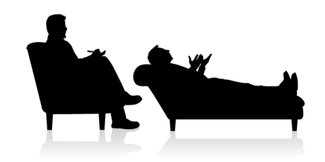 Anyone who has ever gone through counselling (therapy as our American cousins call it) may recognise the depth of questioning necessary to reveal those sorts of emotional scars. But as an author, you can build that character from the ground up to give them hidden depths and secret anxieties. More importantly, you develop them from being a trope into being a ‘real’ person. You don’t have to reveal all that to the reader, at least, not all in one go. It may be something that you keep to yourself or reveal over a series of stories. But when it comes to deciding how your character(s) will react in any situation you put them into, you can draw on that depth of understanding of their emotional baggage to make them more interesting, to make them react consistently and to make them believable.  Emotional engagement. Emotional engagement. In many novels it is very difficult to understand what motivates a character if the author hasn’t actually explained it. Because of that it is difficult to believe in the character and a lack of belief creates a lack of emotional engagement from the reader. And if the reader doesn’t engage with the character on an emotional level, they don’t care what happens to them and they stop reading the book. That might not matter if you only write one book. After all, the reader has already bought it. But if you want to write a second book, it is important. If your first book didn’t engage the reader, they won’t buy your second book. And if they post a bad review of your first book, it will impact sales to other people for all your books, even if they are in a different genre. So having interesting characters is a big deal. This is the difference between plot led and character led fiction, which is an on-going debate in writing circles. Here at Selfishgenie we’re very much in the ‘character led’ camp because a good plot can’t make up for badly drawn characters. Good characters, however, can save a poor plot – as many a Hollywood movie has demonstrated. Why would my character do that? The place to start in this “root cause” journey is with the initiating event, as it’s known. The things that gets the story moving and gets the character involved in the action. Ask yourself “Why would my character do that? What is their motivation? Is that motivation enough to keep them going when the going gets tough?”  A simple Hobbit A simple Hobbit These are questions I asked myself a lot when reading Lord of the Rings. As in “Would a simple Hobbit really keep going in the face of all that opposition? Wouldn’t they just throw the flipping ring into the neatest river and hope for the best?” I’ve read the book several times and the character of Frodo always makes me ask those questions and I’ve never really reached a satisfactory answer. Strength of character and determination to succeed don’t even begin to satisfy as motives. In some types of plot, the triggering event goes with the territory, because it’s the character’s job: police stories, spy thrillers etc. In those cases we have to take a step back and ask questions about why the character got into their job in the first place, as well as why they stay in it when things are going so badly. When we give feedback to authors who submit their manuscripts to us, we often refer to characters being “two dimensional”. It is the deeper motivation of characters that give them their third dimension and make them more human, more realistic. This is especially important if the characters are to go beyond the everyday experiences which we all go through and into worlds where they place themselves in mortal danger. We know we couldn’t do those things – but we have to believe that the character(s) can. Motivation is what makes us believe and motivation comes from deep within – whether we are real people or characters in books. I’m not saying that this sort of analysis is the only way to build good characters – there are many others, I’m sure. But if you are struggling with creating believable characters, this simple tool, "the 6 whys", may help you to add new dimensions to them. If you have enjoyed this blog or found it informative, why not make sure you don't miss future editions by signing up for our newsletter. Just click the button below and you will also qualify for a FREE eBook.
0 Comments
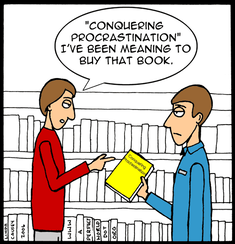 In 1742, poet Edward Young said “Procrastination is the thief of time”. Mind you, he didn’t actually get around to saying it out loud until 1743. No, that’s just my little joke. He said it in the poem “Night Thoughts on Life, Death and Immortality”. I’m not sure if authors are the worst when it comes to procrastination, but if the Selfishgenie Twitter feed is anything to go by, it certainly seems to be that way. In fact, research suggests that 95% of people procrastinate to some degree. It’s just more of a problem for some people than it is for others. Procrastination is not the same as laziness. Many procrastinators are actually highly productive; it’s just that what they produce isn’t necessarily what is important. 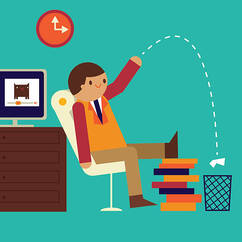 For example, my own favoured form of procrastination is writing blogs. Especially when I should be editing. Either that or writing wonderfully crafted letters to the media about something of great importance in the world. Some of them have even been published - but compared to what I should be doing, they aren't important. At the extreme end of the scale ADHD, OCD, anxiety and depression are all associated with procrastination. So, you could actually be harming your mental health by not doing what you know you should be doing. Procrastination definitely causes feelings of tension and stress, which are both triggers for anxiety and depression. Social media is one of the places where you will find a lot of people procrastinating. It is the ideal place for them to go. They may genuinely mean it when they say “I’ll just take a quick look, just to see what’s trending.” Then, 3 hours later, they’re still there and haven’t done a single bit of work, whatever their work may be.  There are many reasons why people procrastinate. Some believe that they work better if they are up against a deadline. Back in the old days, when I used to manage a team, I could always tell when someone produced their work right at the last minute. For a start, it was usually substandard because it hadn’t been given enough time for research, colleague input, proof reading, editing or re-writes. Or maybe I was just able to recognise the hunted look in my team member’s eyes when they saw me approaching, knowing that at any moment I might ask to see the work I’d asked them to produce a week before and was due on my desk in under an hour and they hadn’t even started it. Other people procrastinate because they think that whatever needs to be done will be challenging in some way and they want to put the task off in the hope that it will go away (it rarely does). That’s not good for an author. If you have an idea for a story, but you are putting off writing it, then you have to ask yourself if you are really cut out to be an author. If you aren’t contracted to produce a book by a certain date, then the only person who is going to suffer from any delay is you. You are bound to feel frustrated if you haven’t even made a start on it. 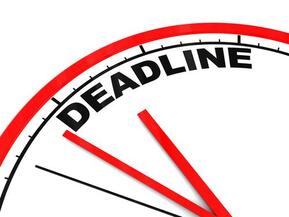 And if you are working to a contractually binding deadline, then re-read my observation above about work being substandard if it’s left to the last minute. I know plenty of authors who procrastinate not because they don’t want to write the story, but because they are worried that when they have finished and they try to find an agent or a publisher, no one will be interested. Or if they self-publish, no one will want to read their book. This fear puts them off finishing their work, because they don’t want to have to face that judgement. So, instead, they will re-write the same chapter (or paragraph or even sentence) time after time, telling themselves they’re trying to find perfection. But all they are really doing is putting off finishing their book. 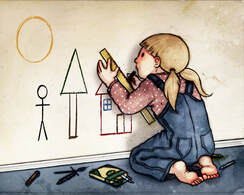 Procrastination and perfectionism go hand in hand. Procrastination and perfectionism go hand in hand. Procrastination and perfectionism are well known to go hand in hand. The question is, does the desire for perfection lead to procrastination, or does the desire to procrastinate lead to perfectionism? What we don’t admit is that there is no such thing as ‘perfect’, but there is plenty of ‘good enough’. This is essentially fear of the unknown. The author doesn’t know how good their work is and is afraid it might not be good enough. A pessimist is more likely to procrastinate than an optimist under those circumstances. Journalist James Surowiecki said that many procrastinators are ‘self handicappers’. Rather than risk failure, they create conditions that make success impossible. I think most procrastinating authors can relate to that. Other people procrastinate because they are worried that when they have finished whatever they are doing, they won’t have anything to move onto, which will leave their lives feeling empty.  Essentially there are three types of procrastinator: those that do nothing (or hang around on social media, which amounts to the same thing), those who do something less important than what they should be doing, or those who do something that they consider to be more important. Surprisingly, getting unimportant things done and getting more important things done are both regarded as being ‘good’ forms of procrastination. By getting the unimportant stuff out of the way, we actually create time to do the more important task, without having to step away from it later to return to the mundane tasks. For example, you want to spend three hours writing, but instead you find yourself doing the laundry, preparing dinner and walking the dog. But that’s great because when you start writing, you won’t have to stop and do those things later and you can focus for three hours non-stop. Doing more important stuff, rather than sitting down and doing the thing you want to, eg writing, also works. So when you do sit down for a couple of hours to write you (a) haven’t anything more important to do that is nagging at you and (b) you can feel virtuous for getting the important stuff out of the way first. "But there are some things you can do to defeat procrastination." But is there an actual ‘cure’ for procrastination? The first thing to do is identify why you are procrastinating. I have suggested a few reasons already, but there are probably more. Only you can know why you are either delaying starting things or delaying finishing them (both are forms of procrastination). Once you have answered the “why” question, you can then start to address the issues, such as lack of confidence in your own ability. But there are some things you can do to defeat procrastination. Commit to the task. Focus on doing, not delaying. It may be helpful to set yourself a deadline for completing something. Perhaps saying “I will write 1,000 words by 4 pm.” Promise yourself a reward for completing what you set out to do. It doesn’t have to be something big, just a 10 minute break for a cup of coffee, or maybe a slice of cake with the coffee you were going to have anyway. Or perhaps 10 minutes catching-up on social media (but make sure it is just 10 minutes).  Minimise distractions Minimise distractions Re-phrase your wording. Don’t say “I need to” or “I have to”, say “I want to” or “I choose to” instead. It is far more likely that we will do the things we want to do than the things we feel we have to do. Minimise distractions. I know, more easily said than done, especially if you have family buzzing around in the background or demanding work colleagues. But there are things you can do. Log-off all social media, so it isn’t pinging away in the background, tempting you into paying it attention. Close down your emails, unplug/switch off the phone, close the door. And if you can’t escape from the family, then work at a time when the family aren’t going to be so much of a problem. For example, if you have a young child, work when the child is napping. Work when older children are at school or organise play dates for them, so they aren’t calling on your time. And tell your partner to make their own damn coffee. If a colleague is demanding attention, agree a set time to meet, when it’s convenient for you (if procrastination is the thief of time, demanding work colleagues are master criminals). If the task is a really big one, break it down into much smaller chunks. Don’t set out to write a book. Set out to write a paragraph – or even a sentence. When you have completed that, write the next paragraph and so on. John F Kennedy may have set a goal of putting a man on the Moon, but NASA actually achieved that goal by solving one small problem at a time. 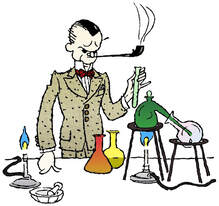 Coffee based procrastination Coffee based procrastination As mentioned above, get the routine chores out of the way first – and quickly. You can then concentrate on what you want to do without feeling any guilt. Don’t turn small things into big ones. A cup of coffee really is just a cup of coffee. It doesn’t have to be made with hand ground beans which you have to slow roast first. Yes, we know those people. We may even be those people. If you want a slice of cake you don’t have to bake it, you can just buy it. You know you are procrastinating when you actually start looking for those sorts of time-wasting activities. But it all starts with knowing that you are procrastinating in the first place. If you don’t realise you are doing it, you can never hope to stop doing it. If you have enjoyed this blog, or found it informative, be sure not to miss future editions by subscribing to our newsletter. Just click on the button below - and you can also get a FREE eBook for subscribing. But don't procrastinate - do it now.  Internet trolls! They get everywhere these days. They’re mainly to be found on social media sites such as Facebook and Twitter, but they can turn up anywhere. You’ll find them in the reviews section of Amazon and other retail sites (the 1 star end of the scale, naturally). They also appear on Goodreads and similar sites. It wouldn’t surprise me if a couple turned up in the comments section of this blog because, let’s face it, they’re not going to like what I have to say about them. I’m not sure if trolls attack authors any more than they attack anyone else, but let’s face it, if you are trying to do something worthwhile, someone will always try to bring you down, which is pretty much the job description of a troll. Some of them may not even think of themselves as being trolls. They just think they're "telling it like it is" (or similar euphemisms to justify obnoxious behaviour) It's easy to say “block them and move on”, but the hurt has already been felt the moment the words are read. And that’s what the trolls know. You can’t un-see and you can’t un-feel. It can leave you feeling low for the rest of the day and even longer. It can make you want to hurt them back, even though you are a nice person who wouldn’t otherwise dream of hurting anyone. It can even make you want to hurt yourself.  It would be nice if the social media platforms et al were to do something about them, but trolls are customers too, so they don’t take action. Not that the trolls spend any money, but the platforms do receive income from any ‘clicks’ they might make on adverts during their daily round of trolling. That was how I experienced my most recent interaction with a troll. I was doing an on-line book promotion for one of our authors, offering a free download of one of his books. I paid a certain social media giant to get that message in front of ‘interested’ users of the platform and, a few days into the promo I received a comment saying “You can’t reduce the price low enough for me to buy this book.” Not the greatest insult in the world, I grant you. Oscar Wilde, if he were still alive, would have no worries about that person stealing his laurels, but it didn’t stop it being a little bit hurtful for the author. "Yes, I actually paid to be trolled." The thing is, because the troll had responded to the advert, I had to pay the social media company. Yes, I actually paid to be trolled. So, I blocked him and moved on. Only I didn’t, did I? Because if I had, you wouldn’t be reading this blog. There are a couple of things we can guess about the person who made the comment. The first things is that he (they are predominantly male) hadn’t actually read any of our books. The second is that they probably don’t read books in the first place. Books enlighten and trolling is a product of ignorance. So, what motivates trolls? "So why do they do it?" It would be easy to dismiss their behaviour as the modern equivalent of the school bully. They do it because they can. But that shows a lack of understanding of bullies. Bullies do what they do not just because they can, but because it demonstrates their power over their victims, especially to those people that hang around bullies, desperate not to become victims themselves. Trolls don’t have hangers on like that, so what they do doesn’t demonstrate their power to anyone. Even those people who actually see the insult on social media won’t know the true identity of the person who posted it. So why do they do it? The real reasons are different and they are several. Trolls don’t all do it for the same reason. Dr Mark Griffiths, Professor of Behavioural Addiction at Nottingham Trent University, gave four reasons: revenge, for attention, out of boredom and for personal amusement. Yes, they find it funny, even if no one else does.  I wouldn’t want to disagree with Dr Griffiths (but you know I’m going to) but I think it runs deeper. I think that the lives of most trolls are so empty and unfulfilled that they can’t stand to see anyone who is living a happy, fulfilled life, so they try to bring them down in the only way available to them. They are similar to the vandals who trash parks, gardens and beauty spots. Their own lives are so bleak and lacking beauty that they can’t stand to see beauty anywhere else. So, you are a happy fulfilled person, expressing your views on Twitter or Facebook, celebrating your successes, bemoaning your minor failures or promoting your work. And they can’t stand your sense of wellbeing, your apparent success, the fact that your problems are quite small compared to theirs and that you are actually achieving things through your work. They can’t stand the fact that you are doing something worthwhile. So they set out to damage that sense of wellbeing. Well, what about the people who are suffering larger problems, like mental health issues, illness or bereavement? They get trolled too. "It gives them an even greater thrill." . Yes they do, but for much the same reason. It’s not enough for the troll that you are feeling low because of whatever is happening in your life. No, that just makes you a soft target. They can make you feel even worse, which is what they want to do. It is a form of sadism. It gives them an even greater thrill. Of course, they have nothing to feel good about. Their lives are still as vacuous as they were before. Their existence is still as pointless. If they are lonely, they will still be lonely. If they are poor and/or unemployed, they will still be poor and/or unemployed. If they can’t form proper relationships, they will still be unable to do so. If their boss is always on their back at work, their boss will still be on their back at work. But for a fleeting few seconds after they hit the key to post their nasty little insult, they feel powerful. In that instant they no longer feel like the losers that they really are. Of course, it doesn’t last. As I said earlier, there is no one there to see their power, so they can’t bask in the fake adoration of their minions. The feeling is so fleeting that they have to start looking for a new target almost immediately. Which is why most trolls spend so much time on-line in the first place. They are addicted to that fleeting moment of pleasure, because they can’t get it anywhere else. 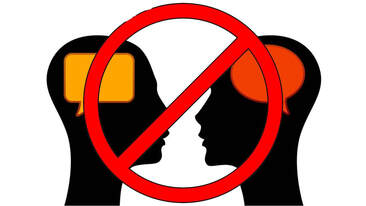 OK, understanding what makes a troll tick doesn’t do anything to get rid of them. Is there actually anything you can do? The first and most important thing is DO NOT INTERACT. If you respond in any way they will know they got to you and that increases their feeling of pleasure. Even if they have sent you into floods of tears, they mustn’t know that they have had any effect on you at all. Report their behaviour. In the short term not much will happen, but if enough people report them, they will be banned from the site. Their IP address will be blocked, which means they won’t be able to re-register under another name unless they do so from a different IP address. Eventually they’ll run out of tech they can use and will have to resort to internet cafes, which cost money. The next thing you must do is block them (if the site has that facility). If not, use whatever contact facilities are available to you to get the troll blocked. On most platforms they won’t even know you have blocked them, but at least it’s one less troll for you to worry about (until they open a new account with a new username). If enough people block them, it will help the site to decide if they should be banned. 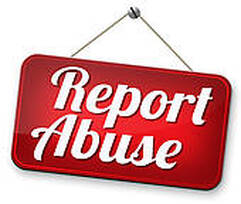 Don’t post on-line that you have been targeted. There’s a good chance that the troll will see your post through the feeds of other people, especially when some people share so indiscriminately. It also encourages other trolls that may see your post. You will be helping them to identify you as a ‘victim’ and trolls love victims. Nothing is private on the internet. You have to assume that your post will be seen by trolls as well as by nice people. If the abuse is really bad, especially if it is racist, homophobic, transphobic, misogynistic or similarly harmful, report it to the police and contact the platform owners using a more direct route than the simple reporting tools that are available. Somewhere there will be a corporate email address or phone number you can use – so use it. Make sure that they understand the emotional impact the trolling is having on you. Make them take responsibility for the bad behaviour of the users of their site. "But we all need to think about our own behaviour" Now all I can do is wish you a happy and a troll free week. But we all need to think about our own behaviour, too. Any of us could be considered to be a troll simply because of the language we use. There is a simple rule to follow: ask yourself if you would say it to someone’s face. If the answer is ‘no’, then its best not to say it at all. Or rephrase it in a way that would allow you to say it to their face. Other than trolls, hardly anyone ever sets out to be offensive, but it’s very easy to cause offence by accident. If you have enjoyed this blog or if you have found it informative, be sure not to miss any future posts by subscribing to our newsletter. Just click on the button below. We promise not to spam you (or troll you). 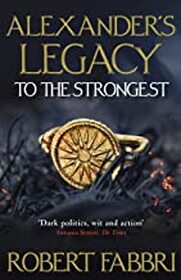 I have been reading books by Robert Fabbri for several years, following his series about the rise of the career of the Emperor Vespasian. This led me to this book, “Alexander’s Legacy: To The Strongest”, the first in a 2 book series about what happened to the Macedonian Empire after Alexander the Great died. Well, quite a lot happened and this book tells it in an exciting fashion. To give you the backstory, if you didn’t already know it: Alexander has conquered his way across the Middle East, Central Asia and into the northern limits of India. He returns to Babylon where he succumbs to illness. Some say he was poisoned, some that he died of natural causes and some say he died of wounds suffered in his final battle in India. You can make up your own mind about that but given the ambitions of several of the people around Alexander, poisoning can’t be ruled out.  Alexander the Great Alexander the Great On his death bed Alexander is surrounded by his seven bodyguards, the men who have followed him loyally across continents. They have only one question on their lips: who is to succeed Alexander? This is not a question Alexander wishes to answer, probably because he doesn’t want anyone to eclipse his achievements. Instead, he replies enigmatically “The strongest”, passes his ring to Perdikkas, one of the seven, and then dies. Perdikkas sees Alexander’s final act as an indication that he should take up the reins of power, which puts him in a minority of one. The other six will only accept the authority of a named successor. Alexander’s natural heir is his half-brother, Phillip, who is mentally incapable of ruling without someone to guide him. This starts a rivalry over who that someone should be.  Ptolemy - founder of a dynasty Ptolemy - founder of a dynasty Alexander also leaves a pregnant wife, Roxanna, and if her child is a boy, he becomes heir, but he would also need a regent until he comes of age. Some of the bodyguards have lesser kinships to Alexander which might allow them to claim the throne, others see themselves in the role of regent, either to Phillip or to the unborn child. Throw into the mix Alexander’s exiled but power-hungry mother, Olympia, who sees Alexander’s death as her opportunity to retake her place at the centre of events and this sets the scene not just for this book, but for the series. The seven bodyguards vie for power and eventually agree to divide the empire between them, controlling large swathes of it until Roxanna’s child (if it’s a boy) comes of age or until some other solution presents itself. In Macedon itself there is Antipatros, the Regent left there by Alexander to govern in his absence. Ptolemy* takes Egypt, with ambitions to expand his satrapy to the west. Perdikkas retains control of Babylon and various smaller tracts of land are handed over to the remaining members of the bodyguard. Also, each has an army, but no single army is capable of seizing control of the empire. 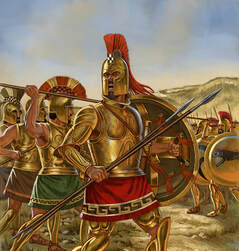 Then there is Alexander’s body. Whoever gains control of that also has a stronger bargaining position. While Perdikkas has the body in Babylon he is in a strong position, but can he keep control of it once he sends it to Macedon to be buried? Meanwhile, Eudamus, Alexander’s Greek secretary and, more recently, a general, knowing he can never inherit the throne of Macedon, sets himself up as king maker, offering his advice and support to whoever makes him the best offer. He isn’t known as “a sly little Greek” for nothing. If you don’t know what happens next (I didn’t) then you won’t want me to spoil the story by saying anything more. The story is told using several different viewpoints, with several of the main characters taking turns to tell their own part of the tale. No doubt is left as to which point of view is being seen at any time, as the chapter headings make that clear. I highly recommend “Alexander’s Legacy: To The Strongest” The plot is engaging and trots along at a nice pace and for fans of Greek or Roman historical fiction I would say that this is a good read and well worth getting into. The research (as far as I can tell) is solid, though the author admits to having to take some small liberties. But he doesn’t purport to make this anything other than a work of fiction, so we can allow him some poetic licence. The wealth of ancient Greek and Macedonian names provides room for confusion; Krateros and Kleitos kept me guessing on more than one occasion. But these were real people once upon a time, so their names can’t really be changed. If you are a feminist, be prepared to get angry because, with the exception of Olympia and a cousin of Alexander’s by the name of Adea, they are seen as a means to cement alliances, no more. Even Adea, who is quite a feisty type, is set only on snagging herself a husband in order to gain power. But that was the nature of the patriarchy in the 4th century BC and it can’t be changed now. I have one adverse comment to make about the book, which is unusual for an author with Fabbri’s track record. The editing is quite poor. There are jumps in the timeline that are made without any sort of signpost, so one character will be engaged in a scene with another and then suddenly a third character appears without warning or introduction. Or there are time gaps or changes of location which take time to work out as they aren’t signposted in any way. In one sentence the characters may be in the throne room and in the next they are apparently somewhere else, without seeming to have moved. There are also numerous typos and punctuation errors. Whoever at Corvus Books was responsible for that really needs to take a fresh look at their work, because it is quite shoddy in parts. However, those are technical issues and shouldn’t deter any reader who wants an enjoyable Ancient Macedonian drama to get their teeth into. I highly recommend “Alexander’s Legacy: To The Strongest” by Robert Fabbri. To find out more about the book, just click on the cover image at the top of this blog. * Ptolemy was the founder of a dynasty of Macedonian-Egyptian Pharaohs that ended with Cleopatra and her famous suicide by asp bite. And if you would like to become a guest reviewer for the Selfishgenie blog, just go to the contacts page to communicate with us. There are just three rules:
If you have enjoyed this blog, found it entertaining or informative (or all three) then be sure not to miss future editions by signing up for our newsletter. Just click the button below. |
AuthorThis blog is compiled and curated by the Selfishgenie publishing team. Archives
June 2025
|

 RSS Feed
RSS Feed